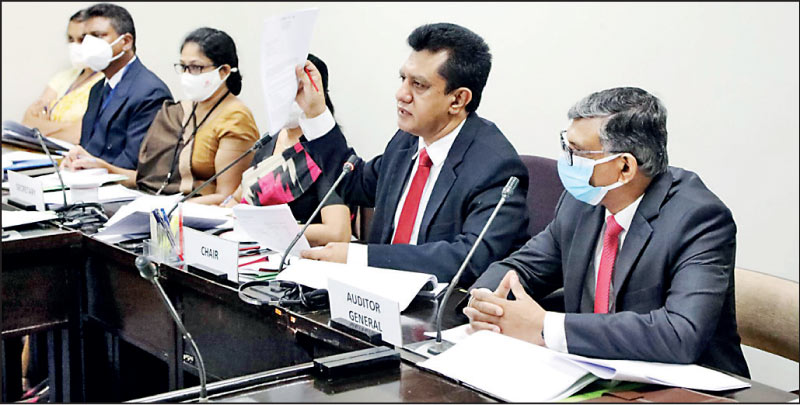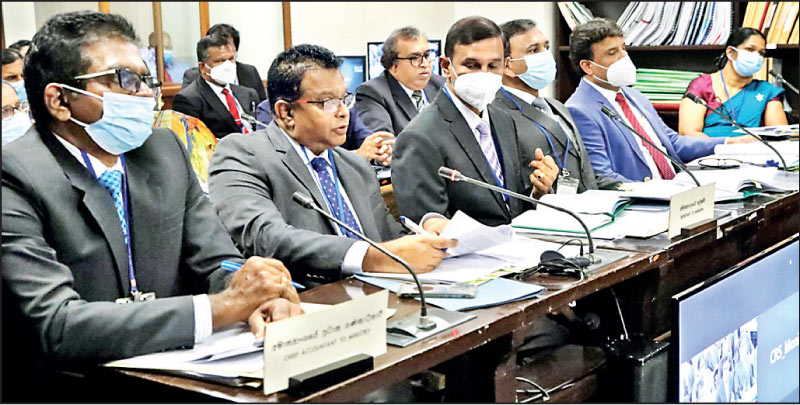Thursday Feb 26, 2026
Thursday Feb 26, 2026
Thursday, 2 June 2022 03:11 - - {{hitsCtrl.values.hits}}


COPE Chairman Charitha Herath directed officials of the State Pharmaceutical Corporation to take action to resolve the drug shortage in the country as soon as possible by using funds from the Indian credit loan assistance and other credit facilities.
Officials from the SPC appeared before the Committee on Tuesday to discuss the shortage of drugs in government hospitals as of 13 May and the measures taken to address the shortage.
The COPE Chairman said that despite receiving $ 200 million in financial assistance under the Indian credit line facility, by 22 April, the Ministry’s Drug Sub-committee had only recommended a stockpile of medical supplies worth $ 55.5 million which is only 28% of that grant. By 18 May, only $ 92.9 million had been recommended for invoices,” he informed the Committee.
Committee members said that as there is a shortage of essential medicines in the country, action should be taken to obtain the required medicines using this money immediately.
SPC officials said that necessary steps are being taken to obtain essential medicines from this money and said the process was delayed due to the appointment of several ministers during this period.
The Committee was told that in addition to the Indian credit line, the World Bank Loan Assistance Scheme (WB), World Health Organisation (WHO), Asian Development Bank (ABD) and other donor assistance were received for purchase of medicine and the assistance so far exceeded $ 330 million and has not yet been disbursed.
Committee members said if the necessary administrative decisions and necessary approvals are taken as soon as possible and medicines are purchased with this money, there will be no shortage of drugs until the middle of 2023.
COPE Chairman noted that the money received to prevent the shortage of drugs had not been properly managed and used effectively. He said it was not the lack of foreign exchange but the inefficiency in management of such funds that has led to the medicine shortage.
The officials who were present also pointed out that there was a shortage of rupees in purchasing medicines. Accordingly, the Secretary to the Ministry of Finance who also joined the meeting online, stated that the necessary steps were taken to resolve it as soon as possible.
COPE also observed that the computer system used for the management of medical supplies had not been properly updated. It was revealed that a company had been given Rs. 645 million to set up the system and Rs. 5 million a month for its maintenance, but the system was not functioning properly. Due to this, work has already commenced to prepare a new computer system at a lower cost and about 80% of the work has already been completed, officials stated.
The Chairman of the COPE Committee also focused on the methodology for calculating the drug requirement in the country and pointed out the importance of maintaining such a system more accurately. Committee members said the method would enable them to identify the need for medicines on a daily basis and the shortage of medicines in advance and take necessary steps to address them.
The procurement process of the State Pharmaceutical Corporation of Sri Lanka (SPC), the Medical Supplies Division of the Ministry of Health (MSD) and the National Drug Regulatory Authority (NMRA) were also discussed at this meeting. Herath said these institutions must work together as they are engaged in the important work of producing medical supplies.
The Committee also discussed the delay in purchasing essential medicines for heart disease, essential medicines for diabetes, medicines used for anaesthesia and essential medicines used for allergies and alternative medicines that can be used for such essential medicines. Discussions were also held on resolving the shortage of medicines for the 1990 ambulance service.
MP Mahindananda Aluthgamage, Rauff Hakeem, Patali Champika Ranawaka, Eran Wickramaratne, Harsha de Silva, Sarath Weerasekera, Madhura Withanage and SM Marikkar were present at this committee meeting.
